In Focus This Week
From Scarcity to Safety
Mitigating Turnover Among Local Election Officials
By Yuguo Liao, PhD, Associate Professor of Political Science and Public Policy Administration, University of Missouri-St. Louis and
David C. Kimball, PhD, Professor of Political Science, University of Missouri-St. Louis
Local election officials (LEOs) are vital to maintaining trust and efficiency in the democratic process. However, turnover intentions among LEOs are concerningly high, with environmental challenges like resource scarcity and safety concerns significantly influencing decisions to leave their positions.
In the work our University of Missouri-St. Louis team conducted in conjunction with the Elections & Voting Information Center (EVIC) and EVIC’s principal researchers Paul Gronke, PhD, (Reed College) and Paul Manson, PhD, (Center for Public Service at Portland State University), we studied resource scarcity and safety concerns and their impact on LEOs’ decisions about leaving their positions. The EVIC team helped facilitate our work by integrating some of our research questions into their 2024 EVIC Local Election Official Survey.
With regard to resource scarcity, our research has shown that limited funding affects nearly 30% of all LEOs of all sized jurisdictions, rising to over 40% in mid-sized jurisdictions, leading to work exhaustion and decreased job satisfaction.
In looking at LEO safety concerns, we found that more than 65% of LEOs report facing verbal or online harassment, and 30% have experienced direct threats.
In the face of these ongoing challenges, we wanted to understand: (1) how workplace conditions (resources and safety) influence LEOs’ turnover decisions, focusing on job satisfaction as the underlying mechanism, and (2) why some LEOs remain despite challenges, examining how psychological empowerment and public service motivation shape the impact of these challenges on LEOs’ job satisfaction and, ultimately, their turnover intentions.
Our findings show the following:
- Adequate resources to conduct the election and educate voters can reduce LEOs’ turnover intentions.
- Safety concerns indeed increase LEOs’ turnover intentions.
- Job satisfaction acts as a psychological bridge between workplace conditions (resource availability and safety) and turnover decisions, which explains more than half of the estimated impact of workplace conditions on LEOs’ turnover intentions.
- LEOs express relatively high levels of psychological empowerment and commitment to public service. They feel psychological empowerment meaning LEOs feel autonomous, competent, and impactful in their roles. The following figure shows the proportion of LEOs who agree about positive features of their job:
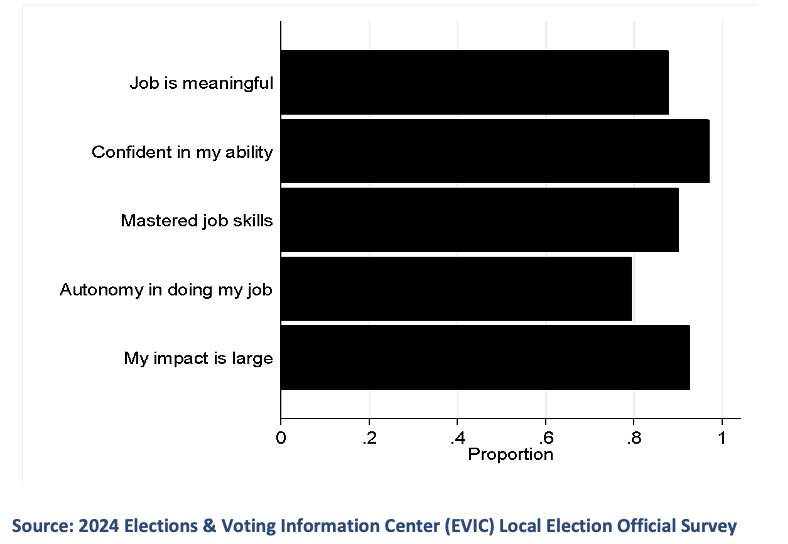
- LEOs report high public service motivation expressing a commitment to serving the public. The following figure shows the proportion of LEOs who agree about the importance of the following values:
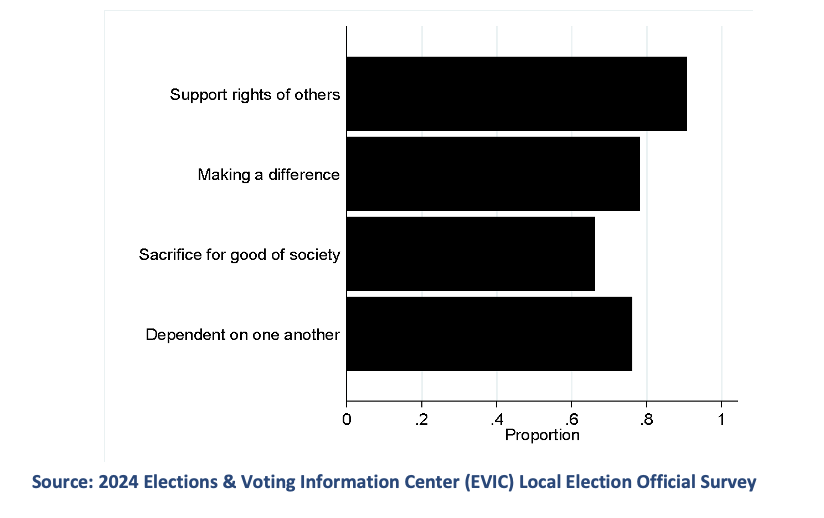
- When LEOs feel highly psychologically empowered, they feel a strong sense of autonomy and competence, which makes the availability of external resources less important for their turnover decisions.
- However, when resources are scarce, LEOs with high public service motivation may make them feel a deep sense of misalignment between their aspirations and the reality of their work environment, pushing them to leave.
- LEOs with high psychological empowerment and high public service motivation are sensitive to safety concerns. As a result, even small safety concerns could lead to a stronger decline in job satisfaction, which in turn makes them more likely to leave the position.
Based on our this research, we make the following policy recommendations:
- Address Environmental Challenges by increasing funding for election administration to alleviate resource scarcity, and strengthen legal protections and penalties for threats and harassment.
- Strengthen Job Satisfaction Monitoring by implementing regular job satisfaction surveys to identify emerging dissatisfaction before it escalates into turnover. Establish feedback mechanisms that allow LEOs to voice concerns about resources and safety in real time.
- Strengthen Psychological Empowerment to reduce resource dependence. Provide leadership development, autonomy, and professional growth opportunities to help LEOs feel more in control of their roles. Recognize and celebrate LEOs’ contributions to reinforce their sense of competence and purpose.
- Address Resource Gaps to retain high-public service motivation LEOs. Secure consistent funding for election administration to prevent frustration among high- public service motivation LEOs who are deeply committed to public service.
- Enhance Safety Protections for high-public service motivation and highly empowered LEOs. Implement comprehensive safety protocols, including increased security at election offices and clear reporting mechanisms for threats. Strengthen legal protections and enforcement against harassment and intimidation targeting election officials. Provide mental health resources and peer support networks to help LEOs cope with safety-related stress.
electionline Daily News Email
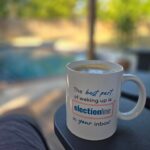 What’s the best part of waking up? electionline Daily News in your inbox of course so be sure to sign up for your daily dose.
What’s the best part of waking up? electionline Daily News in your inbox of course so be sure to sign up for your daily dose.
Each morning you’ll receive the top headlines of the day, plus a listing of states featured in that day’s news round up.
To sign up, simply visit our site and provide us with your email and you’ll begin receiving the news in your inbox each morning.
We Google so you don’t have to!
Election News This Week
 Federal Updates: State and local responses continued to pour in this week from two federal measures–an executive order and legislation in the House. The impacts of how the president’s elections executive order could affect state and local elections continued to be reported this week with news from Alaska, Georgia, Illinois, Maine, Maryland, Minnesota, New Jersey, New York, Tennessee,and West Virginia. Additionally, Democrats in the U.S. Senate filed the Defending America’s Future Elections Act which would prevent the U.S. DOGE Service from accessing voter registration data and state records. “This illegal and unconstitutional power grab by President Trump is another attempt to make it harder for millions of Americans to vote,” Sen. Alex Padilla, D-Calif., said in a statement. “It would disproportionately impact women, rural communities, members of our military and millions of Americans who don’t have every piece of identification Trump wants to require.” On the legal front, the Campaign Legal Center and the State Democracy Defenders Fund brought the first lawsuit April 3. The DNC, the Democratic Governors Association, and Senate and House Democratic leaders followed soon after with a complaint of their own. The legal challenges had been expected after election lawyers warned some of the demands in the order, including a proof-of-citizenship requirement for voter registration and new ballot deadline rules, may violate the U.S. Constitution. Regarding the SAVE Act, nearly 60 bipartisan election officials from across the country expressed their opposition to the SAVE Act in a letter addressed to members of the Senate Rules and Administration Committee and the House Administration Committee, election officials said the SAVE Act “places unfunded, operationally unrealistic, and legally precarious burdens on election offices across the country.” “States already have systems in place to verify voter identity, and many have backend processes to confirm citizenship status,” the letter states. “As election officials, our priority is to conduct secure, efficient, and well-organized elections. The SAVE Act places an unfunded, unworkable, and legally risky burden on election administrators without offering the necessary resources or implementation support. We urge you to oppose this bill and instead work with election officials to develop policies that strengthen election security without jeopardizing administrative efficiency or exposing election personnel to legal liability.”
Federal Updates: State and local responses continued to pour in this week from two federal measures–an executive order and legislation in the House. The impacts of how the president’s elections executive order could affect state and local elections continued to be reported this week with news from Alaska, Georgia, Illinois, Maine, Maryland, Minnesota, New Jersey, New York, Tennessee,and West Virginia. Additionally, Democrats in the U.S. Senate filed the Defending America’s Future Elections Act which would prevent the U.S. DOGE Service from accessing voter registration data and state records. “This illegal and unconstitutional power grab by President Trump is another attempt to make it harder for millions of Americans to vote,” Sen. Alex Padilla, D-Calif., said in a statement. “It would disproportionately impact women, rural communities, members of our military and millions of Americans who don’t have every piece of identification Trump wants to require.” On the legal front, the Campaign Legal Center and the State Democracy Defenders Fund brought the first lawsuit April 3. The DNC, the Democratic Governors Association, and Senate and House Democratic leaders followed soon after with a complaint of their own. The legal challenges had been expected after election lawyers warned some of the demands in the order, including a proof-of-citizenship requirement for voter registration and new ballot deadline rules, may violate the U.S. Constitution. Regarding the SAVE Act, nearly 60 bipartisan election officials from across the country expressed their opposition to the SAVE Act in a letter addressed to members of the Senate Rules and Administration Committee and the House Administration Committee, election officials said the SAVE Act “places unfunded, operationally unrealistic, and legally precarious burdens on election offices across the country.” “States already have systems in place to verify voter identity, and many have backend processes to confirm citizenship status,” the letter states. “As election officials, our priority is to conduct secure, efficient, and well-organized elections. The SAVE Act places an unfunded, unworkable, and legally risky burden on election administrators without offering the necessary resources or implementation support. We urge you to oppose this bill and instead work with election officials to develop policies that strengthen election security without jeopardizing administrative efficiency or exposing election personnel to legal liability.”
 Spring Elections: Elections were held at the state and local level across the country this week including in Alaska, Florida, Illinois, Mississippi and Wisconsin. By and large, things ran smoothly on Tuesday although there were some scattered issues. In Green Bay Wisconsin an early morning power outage on the city’s west side affected power at three different polling locations for a short moment. All the tabulators at those locations have batteries that allowed voters to still insert their ballots. A court order extended polling hours in the Village of Kronenwetter until 9 p.m. due to technical issues earlier in the day. The extension follows a petition filed by Marathon County Clerk Kim Trueblood and Village of Kronenwetter Clerk Jennifer Poyer, after technology issues caused significant delays at the Kronenwetter Municipal Center earlier on Tuesday. “To the best of my understanding, the electronic poll books were experiencing some delays in getting people checked in to vote. So, when voters would come in, present their driver’s license, there was a lag in that electronic poll book system. So it was taking a long time for voters to get checked in,” Trueblood said. At least seven Milwaukee polling places ran out of ballots due to an “historic turnout” for a spring election, according to Melissa Howard of the Milwaukee Election Commission. Election officials increased field staff and sent ExpressVote machines that are used at early voting to those locations, along with additional ballots, she said. Online rumors that ICE agents were patrolling in the areas of polling places in Milwaukee and Madison seemed to be unfounded. Spokespersons for Milwaukee and Madison city government told Wisconsin Examiner that they have not heard any reports, complaints, or notifications about ICE agents at polling places. A spokesperson for the ICE office in Milwaukee said, “due to our operational tempo and the increased interest in our agency, we are not able to research and respond to rumors or specifics of routine daily operations for ICE.” And voters in Wisconsin voted overwhelmingly to enshrine the state’s existing voter ID law into the state constitution. In Florida, which was holding a special election to fill a US House seat, some polling locations experienced “temporary ballot shortages”. The Escambia County Supervisor of Elections Office alerted the media at 7 p.m. as polls were closing − and published a notice on its website − acknowledging the issue and assuring voters that every vote would be counted. “Due to unprecedented voter turnout in today’s Special General Election for U.S. House of Representatives, District 1, some precinct locations in Escambia County have experienced temporary ballot shortages,” the notice said. In Mississippi, which held municipal elections this week, voters in Jackson were confused due to changes in polling locations. The confusion stemmed from thousands of Jackson voters having new precinct locations after redistricting last year put them into a new city council ward, and some voters didn’t realize their polling place for the municipal elections may differ from where they voted in last year’s national elections, which are run by the counties. Angela Harris, the Jackson municipal clerk, said her office worked to inform voters by mailing out thousands of letters to Jacksonians whose precincts changed, including the roughly 6,000 whose wards changed during the 2024 redistricting. “I am over-swamped,” she told Mississippi Today. And in what may be a first even for electionline, because we feel like we’ve heard it all, a polling place in Columbus, Mississippi opened 30 minutes late because an election worker’s vehicle containing ballots was repossessed overnight. The receiving and returning manager for the First Assembly precinct in Ward 3 signed for a sealed and locked ballot box at the city registrar’s office Monday evening and took it home. But 6am came and went. There were no ballots. “We couldn’t find him,” Election Commissioner Julie Parker told The Dispatch. “We couldn’t get him on the phone. When we finally did, he told us his car was gone that had everything in it. … Only in Columbus.” Parker said new ballots arrived and voting began by 7:30. Jammie Garrett, chief operations officer for the city, said four voters left during that 30-minute gap but said they would return to vote before polls closed. Garrett confirmed the election worker’s vehicle had been repossessed. She tracked it to a recovery yard in Columbus, where the election worker retrieved the ballot box and returned it to the registrar’s office.
Spring Elections: Elections were held at the state and local level across the country this week including in Alaska, Florida, Illinois, Mississippi and Wisconsin. By and large, things ran smoothly on Tuesday although there were some scattered issues. In Green Bay Wisconsin an early morning power outage on the city’s west side affected power at three different polling locations for a short moment. All the tabulators at those locations have batteries that allowed voters to still insert their ballots. A court order extended polling hours in the Village of Kronenwetter until 9 p.m. due to technical issues earlier in the day. The extension follows a petition filed by Marathon County Clerk Kim Trueblood and Village of Kronenwetter Clerk Jennifer Poyer, after technology issues caused significant delays at the Kronenwetter Municipal Center earlier on Tuesday. “To the best of my understanding, the electronic poll books were experiencing some delays in getting people checked in to vote. So, when voters would come in, present their driver’s license, there was a lag in that electronic poll book system. So it was taking a long time for voters to get checked in,” Trueblood said. At least seven Milwaukee polling places ran out of ballots due to an “historic turnout” for a spring election, according to Melissa Howard of the Milwaukee Election Commission. Election officials increased field staff and sent ExpressVote machines that are used at early voting to those locations, along with additional ballots, she said. Online rumors that ICE agents were patrolling in the areas of polling places in Milwaukee and Madison seemed to be unfounded. Spokespersons for Milwaukee and Madison city government told Wisconsin Examiner that they have not heard any reports, complaints, or notifications about ICE agents at polling places. A spokesperson for the ICE office in Milwaukee said, “due to our operational tempo and the increased interest in our agency, we are not able to research and respond to rumors or specifics of routine daily operations for ICE.” And voters in Wisconsin voted overwhelmingly to enshrine the state’s existing voter ID law into the state constitution. In Florida, which was holding a special election to fill a US House seat, some polling locations experienced “temporary ballot shortages”. The Escambia County Supervisor of Elections Office alerted the media at 7 p.m. as polls were closing − and published a notice on its website − acknowledging the issue and assuring voters that every vote would be counted. “Due to unprecedented voter turnout in today’s Special General Election for U.S. House of Representatives, District 1, some precinct locations in Escambia County have experienced temporary ballot shortages,” the notice said. In Mississippi, which held municipal elections this week, voters in Jackson were confused due to changes in polling locations. The confusion stemmed from thousands of Jackson voters having new precinct locations after redistricting last year put them into a new city council ward, and some voters didn’t realize their polling place for the municipal elections may differ from where they voted in last year’s national elections, which are run by the counties. Angela Harris, the Jackson municipal clerk, said her office worked to inform voters by mailing out thousands of letters to Jacksonians whose precincts changed, including the roughly 6,000 whose wards changed during the 2024 redistricting. “I am over-swamped,” she told Mississippi Today. And in what may be a first even for electionline, because we feel like we’ve heard it all, a polling place in Columbus, Mississippi opened 30 minutes late because an election worker’s vehicle containing ballots was repossessed overnight. The receiving and returning manager for the First Assembly precinct in Ward 3 signed for a sealed and locked ballot box at the city registrar’s office Monday evening and took it home. But 6am came and went. There were no ballots. “We couldn’t find him,” Election Commissioner Julie Parker told The Dispatch. “We couldn’t get him on the phone. When we finally did, he told us his car was gone that had everything in it. … Only in Columbus.” Parker said new ballots arrived and voting began by 7:30. Jammie Garrett, chief operations officer for the city, said four voters left during that 30-minute gap but said they would return to vote before polls closed. Garrett confirmed the election worker’s vehicle had been repossessed. She tracked it to a recovery yard in Columbus, where the election worker retrieved the ballot box and returned it to the registrar’s office.
 History in the News: A bit of history is back in the hands of county officials in Rockingham County, Virginia. The circuit court received six voter registration books (1902-1960) from local residents Sylvia and David Mehegan. These books, discovered among family papers of Pauline Fawley Beard whole served as registrar for the Edom Precinct. Beard. The books document voter registration in the Edom Precinct of the Linville District, including white, African American, and female voters, and will be preserved and made available to the public. “The right to vote is a fundamental freedom for American democracy,” said Circuit Court Clerk Chaz W. Haywood in a press release. “These registration books reflect the evolution of voting history in Rockingham County, and I am deeply grateful to the Mehegan family for recognizing their importance and ensuring their preservation at the courthouse.”
History in the News: A bit of history is back in the hands of county officials in Rockingham County, Virginia. The circuit court received six voter registration books (1902-1960) from local residents Sylvia and David Mehegan. These books, discovered among family papers of Pauline Fawley Beard whole served as registrar for the Edom Precinct. Beard. The books document voter registration in the Edom Precinct of the Linville District, including white, African American, and female voters, and will be preserved and made available to the public. “The right to vote is a fundamental freedom for American democracy,” said Circuit Court Clerk Chaz W. Haywood in a press release. “These registration books reflect the evolution of voting history in Rockingham County, and I am deeply grateful to the Mehegan family for recognizing their importance and ensuring their preservation at the courthouse.”
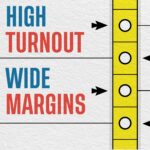 Podcast News: The folks at High Turnout Wide Margins are out with a new episode and new season! Season 4 of the elections-related podcast kicks off from Puerto Rico! In January, the HTWM team was invited to record a live episode at the Southern Political Science Association meeting held in San Juan, Puerto Rico. Hosts Brianna Lennon and Eric Fey sat down with Paul Gronke and Paul Manson of the Elections & Voting Information Center about results of last year’s Local Election Official Survey Project, looking at challenges, attitudes, and job satisfaction.
Podcast News: The folks at High Turnout Wide Margins are out with a new episode and new season! Season 4 of the elections-related podcast kicks off from Puerto Rico! In January, the HTWM team was invited to record a live episode at the Southern Political Science Association meeting held in San Juan, Puerto Rico. Hosts Brianna Lennon and Eric Fey sat down with Paul Gronke and Paul Manson of the Elections & Voting Information Center about results of last year’s Local Election Official Survey Project, looking at challenges, attitudes, and job satisfaction.
 Sticker News: Congratulations to Valley Center High School student Madeline Smith for winning this year’s Sedgwick County, Kansas “I Voted” sticker contest. “Thousands of voters will now wear Madeline’s design on the sticker they get at the polls or with an advance ballot,” said Election Commissioner Laura Rainwater. “This contest is a fun way to get students involved in elections, even before some of them are old enough to vote!” A panel of judges chosen from the community picked the winning artwork from 215 entries. “We had so many wonderful designs submitted, almost twice as many as last year,” said Rainwater. “It was impressive to see the many creative ways students captured the spirit of Sedgwick County and our patriotic community. The judges had a tough job choosing the top three entries.” This week, the City of Kenosha, Wisconsin announced the winners of their 2025 “I Voted” sticker contest.
Sticker News: Congratulations to Valley Center High School student Madeline Smith for winning this year’s Sedgwick County, Kansas “I Voted” sticker contest. “Thousands of voters will now wear Madeline’s design on the sticker they get at the polls or with an advance ballot,” said Election Commissioner Laura Rainwater. “This contest is a fun way to get students involved in elections, even before some of them are old enough to vote!” A panel of judges chosen from the community picked the winning artwork from 215 entries. “We had so many wonderful designs submitted, almost twice as many as last year,” said Rainwater. “It was impressive to see the many creative ways students captured the spirit of Sedgwick County and our patriotic community. The judges had a tough job choosing the top three entries.” This week, the City of Kenosha, Wisconsin announced the winners of their 2025 “I Voted” sticker contest.
Personnel News: Clytia Riddick has resigned as the Gates County, North Carolina board of elections director. Republican state Rep. Alexander Kolodin announced his plans to run for Arizona secretary of state in 2026. Rachel Garcia is the new Williams County, Ohio board of elections director. Miller County Judge Cathy Hardin Harrison has announced her candidacy for Arkansas secretary of state.
New Research and Reports
 Vote At Home: This week, the National Vote at Home Institute (NVAHI) issued a research paper examining turnout in the 2024 primary election cycle. In addition to documenting the abysmal overall turnout – with more than four in five voters not participating – the report found that Universal Vote at Home (VAH) states produced nearly double the turnout rate of non-Vote at Home states in primary elections. In regular State Primary Elections, where voters chose Republican and Democratic party nominees for the November general election, only 44 million of an estimated 235 million eligible citizens cast ballots, or less than 1 in 5. In contrast, in Universal Vote at Home states, where every active registered voter is automatically delivered a ballot, aggregate primary election turnout levels were approximately double those in traditional site based/polling-place states. In these jurisdictions, the combined turnout was 30% of eligible citizens and 34% of registered voters, compared to 16% and 19% in non-VAH states. This super minority of voters determine the results of primary races that are now so important that they effectively choose an estimated 90% of winners for top federal and state offices. The NVAHI analysis also revealed that the median age of 2024 primary voters nationwide was 65. Voters 65 and older had a six-times higher turnout rate (36%) than those aged 18-34, who had just a 6% turnout. VAH states consistently showed higher voter turnout across all age groups.
Vote At Home: This week, the National Vote at Home Institute (NVAHI) issued a research paper examining turnout in the 2024 primary election cycle. In addition to documenting the abysmal overall turnout – with more than four in five voters not participating – the report found that Universal Vote at Home (VAH) states produced nearly double the turnout rate of non-Vote at Home states in primary elections. In regular State Primary Elections, where voters chose Republican and Democratic party nominees for the November general election, only 44 million of an estimated 235 million eligible citizens cast ballots, or less than 1 in 5. In contrast, in Universal Vote at Home states, where every active registered voter is automatically delivered a ballot, aggregate primary election turnout levels were approximately double those in traditional site based/polling-place states. In these jurisdictions, the combined turnout was 30% of eligible citizens and 34% of registered voters, compared to 16% and 19% in non-VAH states. This super minority of voters determine the results of primary races that are now so important that they effectively choose an estimated 90% of winners for top federal and state offices. The NVAHI analysis also revealed that the median age of 2024 primary voters nationwide was 65. Voters 65 and older had a six-times higher turnout rate (36%) than those aged 18-34, who had just a 6% turnout. VAH states consistently showed higher voter turnout across all age groups.
Ballot Measures, Legislation & Rulemaking
 Colorado: The Senate gave preliminary approval to a bill intended to codify in Colorado certain anti-discrimination provisions of the federal Voting Rights Act. Senate Bill 25-1 would mirror the VRA to “prohibit election practices that create disparities in participation for communities of color and other protected groups,” Sen. Julie Gonzales, a Denver Democrat, said. The Colorado Voting Rights Act also includes protections for LGBTQ+ voters, expands multilingual ballot access, and requires accommodations for people with disabilities at residential facilities. The attorney general’s office will be able to enforce the act so Colorado voters don’t need to depend on the federal government to enforce the VRA. Gonzales sponsored the bill in the Senate, where it will need to pass one more vote before it goes to the Colorado House of Representatives for further debate. House sponsors are Assistant Majority Leader Jennifer Bacon, a Denver Democrat, and Rep. Junie Joseph, a Boulder Democrat. Democrats hold strong majorities in both chambers.
Colorado: The Senate gave preliminary approval to a bill intended to codify in Colorado certain anti-discrimination provisions of the federal Voting Rights Act. Senate Bill 25-1 would mirror the VRA to “prohibit election practices that create disparities in participation for communities of color and other protected groups,” Sen. Julie Gonzales, a Denver Democrat, said. The Colorado Voting Rights Act also includes protections for LGBTQ+ voters, expands multilingual ballot access, and requires accommodations for people with disabilities at residential facilities. The attorney general’s office will be able to enforce the act so Colorado voters don’t need to depend on the federal government to enforce the VRA. Gonzales sponsored the bill in the Senate, where it will need to pass one more vote before it goes to the Colorado House of Representatives for further debate. House sponsors are Assistant Majority Leader Jennifer Bacon, a Denver Democrat, and Rep. Junie Joseph, a Boulder Democrat. Democrats hold strong majorities in both chambers.
 Connecticut: A bill to allow ranked-choice voting (RCV) in some elections was approved by the Connecticut Legislature’s Government Administration and Elections Committee late Wednesday night. The measure has failed in Connecticut in previous sessions. If it passed this year, Connecticut would join a growing list of states and cities that use the method, including New York City, Maine and Alaska. This year’s bill comes after the Governor’s Ranked-Choice Voting Working Group, which met several times last year to develop the proposal, recommended the state adopt RCV. Current state law doesn’t allow for RCV in primary or general elections. The group was chaired by State Senator Tony Hwang (R-Fairfield). He testified in support of the bill. “I believe that Senate Bill 1536 will modernize our electoral system and help move Connecticut toward a more inclusive and fair voting process. Ranked-choice voting has the potential to bring about a more representative democracy, reduce polarization, and allow for a healthier and more engaging political environment for all voters,” Hwang stated in his testimony. The legislation would only allow ranked-choice voting in party caucuses, conventions, and primaries, and it would be optional for municipalities and parties to adopt.
Connecticut: A bill to allow ranked-choice voting (RCV) in some elections was approved by the Connecticut Legislature’s Government Administration and Elections Committee late Wednesday night. The measure has failed in Connecticut in previous sessions. If it passed this year, Connecticut would join a growing list of states and cities that use the method, including New York City, Maine and Alaska. This year’s bill comes after the Governor’s Ranked-Choice Voting Working Group, which met several times last year to develop the proposal, recommended the state adopt RCV. Current state law doesn’t allow for RCV in primary or general elections. The group was chaired by State Senator Tony Hwang (R-Fairfield). He testified in support of the bill. “I believe that Senate Bill 1536 will modernize our electoral system and help move Connecticut toward a more inclusive and fair voting process. Ranked-choice voting has the potential to bring about a more representative democracy, reduce polarization, and allow for a healthier and more engaging political environment for all voters,” Hwang stated in his testimony. The legislation would only allow ranked-choice voting in party caucuses, conventions, and primaries, and it would be optional for municipalities and parties to adopt.
 Delaware: Sen. Darius Brown (D-New Castle) reintroduced efforts to add early voting, mail-in voting and permanent absentee voting to the Delaware Constitution after a similar attempt failed last year. Mail-in voting, same-day voter registration, permanent absentee voting and early voting have all been struck down by Delaware courts in recent years. Only early voting and permanent absentee voting returned after the Delaware Supreme Court found the plaintiffs in that case lacked proper standing, but the merits of the case remain untouched. Voting rights advocates and some lawmakers argue this leaves the right to early voting and permanent absentee status unprotected, unless the voting procedures are added to Delaware’s Constitution. Brown introduced a constitutional amendment addressing those two voting procedures — along with no-excuse or absentee voting — last year, but with Republicans claiming support only for early voting and not permanent absentee or mail-in voting, the amendment failed. Brown is trying again this year, this time with two separate amendments: one for early voting and one for absentee voting. Part of what makes the voting rights codification process unusually complicated is the fact that Delaware, unlike many other states, has the six excuses necessary to request an absentee ballot request outlined in the state constitution, rather than in its code. Those excuses include being in the public service of the United States or of Delaware — or being a spouse or dependent of someone in service — the nature of one’s business or occupation, sickness or physical disability, absence from the district while on vacation or religious reasons. Brown’s constitutional amendment would void these excuses and allow anyone to request an absentee ballot as long as they are a qualified voter. The amendment would also enshrine permanent absentee status, allowing voters to register to receive an absentee ballot for every election without having to file individual requests. This provision is largely for members of the military or those with physical disabilities.
Delaware: Sen. Darius Brown (D-New Castle) reintroduced efforts to add early voting, mail-in voting and permanent absentee voting to the Delaware Constitution after a similar attempt failed last year. Mail-in voting, same-day voter registration, permanent absentee voting and early voting have all been struck down by Delaware courts in recent years. Only early voting and permanent absentee voting returned after the Delaware Supreme Court found the plaintiffs in that case lacked proper standing, but the merits of the case remain untouched. Voting rights advocates and some lawmakers argue this leaves the right to early voting and permanent absentee status unprotected, unless the voting procedures are added to Delaware’s Constitution. Brown introduced a constitutional amendment addressing those two voting procedures — along with no-excuse or absentee voting — last year, but with Republicans claiming support only for early voting and not permanent absentee or mail-in voting, the amendment failed. Brown is trying again this year, this time with two separate amendments: one for early voting and one for absentee voting. Part of what makes the voting rights codification process unusually complicated is the fact that Delaware, unlike many other states, has the six excuses necessary to request an absentee ballot request outlined in the state constitution, rather than in its code. Those excuses include being in the public service of the United States or of Delaware — or being a spouse or dependent of someone in service — the nature of one’s business or occupation, sickness or physical disability, absence from the district while on vacation or religious reasons. Brown’s constitutional amendment would void these excuses and allow anyone to request an absentee ballot as long as they are a qualified voter. The amendment would also enshrine permanent absentee status, allowing voters to register to receive an absentee ballot for every election without having to file individual requests. This provision is largely for members of the military or those with physical disabilities.
 Florida: An election measure raising citizenship-related roadblocks to voter eligibility won approval in a House committee this week, but not before receiving criticism from members of the public — some who thought it is far too restrictive, and others who thought it isn’t tough enough. Fort Myers Republican Jenna Persons-Mulicka presented her bill (HB 1381) before the House Government Operations Subcommittee. It now has two more stops before going to the floor. The measure contains numerous provisions ostensibly to ensure that only U.S. citizens vote. It says that if an applicant has not provided the necessary evidence of their legal status, or is not verified before the applicant requests a vote-by-mail ballot or presents to vote, the applicant must be provided a provisional ballot that can be counted only if they confirm their legal status by 5 p.m. on the Thursday after a Tuesday election. The bill also says that a supervisor of elections must remove the name of a deceased voter from the voter rolls within seven days if they receive a copy of a death certificate or a published obituary or notice of death, a letter of probate or estate administration, or “personal knowledge” of a registered voter’s death. Other provisions include: The state’s division of elections office can use lists from federal agencies or other state governments to remove voters from the rolls. It requires jury coordinators for federal jury duty to create a list of those disqualified for not being U.S. citizens and to provide it to the Florida Division of Elections according to the jury summons cycle used by the court clerk. Eliminates certain categories of voter identification options such as student identification, debit or credit cards, and retirement cards. Changes from “challenge” to “protest” voter challenges of vote-by-mail ballots. In a manual review of ballots open to the public, the bill says that each political party may designate one person with “expertise in the computer field” who must be allowed in the central counting room where all tests are being conducted and where the official votes are being counted. Requires all voting to be by paper ballot, unless a person with a disability requires a voter-interface device. Would make Florida the first state in the nation to require an automated, independent vote validation process for every ballot cast in every election before certification.
Florida: An election measure raising citizenship-related roadblocks to voter eligibility won approval in a House committee this week, but not before receiving criticism from members of the public — some who thought it is far too restrictive, and others who thought it isn’t tough enough. Fort Myers Republican Jenna Persons-Mulicka presented her bill (HB 1381) before the House Government Operations Subcommittee. It now has two more stops before going to the floor. The measure contains numerous provisions ostensibly to ensure that only U.S. citizens vote. It says that if an applicant has not provided the necessary evidence of their legal status, or is not verified before the applicant requests a vote-by-mail ballot or presents to vote, the applicant must be provided a provisional ballot that can be counted only if they confirm their legal status by 5 p.m. on the Thursday after a Tuesday election. The bill also says that a supervisor of elections must remove the name of a deceased voter from the voter rolls within seven days if they receive a copy of a death certificate or a published obituary or notice of death, a letter of probate or estate administration, or “personal knowledge” of a registered voter’s death. Other provisions include: The state’s division of elections office can use lists from federal agencies or other state governments to remove voters from the rolls. It requires jury coordinators for federal jury duty to create a list of those disqualified for not being U.S. citizens and to provide it to the Florida Division of Elections according to the jury summons cycle used by the court clerk. Eliminates certain categories of voter identification options such as student identification, debit or credit cards, and retirement cards. Changes from “challenge” to “protest” voter challenges of vote-by-mail ballots. In a manual review of ballots open to the public, the bill says that each political party may designate one person with “expertise in the computer field” who must be allowed in the central counting room where all tests are being conducted and where the official votes are being counted. Requires all voting to be by paper ballot, unless a person with a disability requires a voter-interface device. Would make Florida the first state in the nation to require an automated, independent vote validation process for every ballot cast in every election before certification.
 Georgia: Lawmakers advanced two election bills last week, setting up final votes on banning absentee ballot drop-off the weekend before Election Day, prohibiting last-minute State Election Board rules and withdrawing the state from a voter registration accuracy organization. GOP legislators backed away from one of their most contentious proposals, which would have required a hand count of ballots on election night. The provision no longer appears in either bill following opposition from county election directors. The State Election Board tried to mandate the hand count last year, but a judge ruled the board exceeded its authority. The bills advanced in separate House and Senate committee votes, with legislators voting along party lines.Republicans supported the legislation and Democrats opposed it. To become law, the bills would have to pass both chambers before the Georgia General Assembly adjourns April 4. “We’re not giving everybody everything they’ve asked for,” said House Governmental Affairs Committee Chairman Victor Anderson, a Republican from Cornelia. “We’ve done so much with elections over the last four years. The provisions we call for in this bill are fairly common sense and justified.” Both measures, House Bill 397 and Senate Bill 175, call for Georgia to quit a 24-state partnership called the Electronic Registration Information Center, which exchanges voter information between states to identify outdated registrations. The bills also prevent new State Election Board rules within 60 days of an election, a response to the Republican-led board’s attempt last fall to require hand ballot counts and change requirements for certifying results. And the legislation would prohibit counties from accepting in-person delivery of absentee ballots the weekend before an election. That practice led to complaints by the Republican Party last year. In addition, cities would be able to decide not to allow early voting on Saturdays for municipal elections. The Senate’s elections bill goes further, giving the State Election Board custody of the secretary of state’s election investigation reports and requiring after-hours video surveillance of drop boxes at early voting locations.
Georgia: Lawmakers advanced two election bills last week, setting up final votes on banning absentee ballot drop-off the weekend before Election Day, prohibiting last-minute State Election Board rules and withdrawing the state from a voter registration accuracy organization. GOP legislators backed away from one of their most contentious proposals, which would have required a hand count of ballots on election night. The provision no longer appears in either bill following opposition from county election directors. The State Election Board tried to mandate the hand count last year, but a judge ruled the board exceeded its authority. The bills advanced in separate House and Senate committee votes, with legislators voting along party lines.Republicans supported the legislation and Democrats opposed it. To become law, the bills would have to pass both chambers before the Georgia General Assembly adjourns April 4. “We’re not giving everybody everything they’ve asked for,” said House Governmental Affairs Committee Chairman Victor Anderson, a Republican from Cornelia. “We’ve done so much with elections over the last four years. The provisions we call for in this bill are fairly common sense and justified.” Both measures, House Bill 397 and Senate Bill 175, call for Georgia to quit a 24-state partnership called the Electronic Registration Information Center, which exchanges voter information between states to identify outdated registrations. The bills also prevent new State Election Board rules within 60 days of an election, a response to the Republican-led board’s attempt last fall to require hand ballot counts and change requirements for certifying results. And the legislation would prohibit counties from accepting in-person delivery of absentee ballots the weekend before an election. That practice led to complaints by the Republican Party last year. In addition, cities would be able to decide not to allow early voting on Saturdays for municipal elections. The Senate’s elections bill goes further, giving the State Election Board custody of the secretary of state’s election investigation reports and requiring after-hours video surveillance of drop boxes at early voting locations.
Athens Representative Houston Gaines has confirmed that legislation that would change the formation of the Athens-Clarke County Board of Elections will not pass this session. A pair of bills sponsored by Athens-area Republicans were sent back to committee this week. With the end of the legislative session Friday, the bills will not make it to the floor. Representative Houston Gaines introduced House Bills 851 and 852 last week. The bills sought to abolish the Board of Elections in Athens-Clarke County and change the way its members are appointed. On Monday, the bills were pulled from the House and recommitted to the Intragovernmental Coordination Committee. In a statement, Representative Houston Gaines said that discussions would resume in the fall to address the “legal and policy issues with the current makeup of the Board.”
 Indiana: Senate Bill 10 would specifically ban state university-issued IDs from being acceptable forms of photo identification used at the voting booth, seemingly to address fears about non-residents voting in Indiana elections, even though this part of the law has nothing to do with address verification. The Indiana House passed the bill by a 66-25 vote Tuesday along predictable party lines. Democrats see it as disenfranchising young voters in a state with already dismal voter turnout statistics. Republicans see it as enhancing election security. The section of the law this bill proposes editing is the Photo ID law passed in 2005. When voters cast their ballot on Election Day, they need to show a photo ID that has four components: A name matching their voter registration, a photo, a valid expiration date and the ID needs to be issued by the state or federal government. Student IDs from state colleges can be used, so long as they have these four elements.
Indiana: Senate Bill 10 would specifically ban state university-issued IDs from being acceptable forms of photo identification used at the voting booth, seemingly to address fears about non-residents voting in Indiana elections, even though this part of the law has nothing to do with address verification. The Indiana House passed the bill by a 66-25 vote Tuesday along predictable party lines. Democrats see it as disenfranchising young voters in a state with already dismal voter turnout statistics. Republicans see it as enhancing election security. The section of the law this bill proposes editing is the Photo ID law passed in 2005. When voters cast their ballot on Election Day, they need to show a photo ID that has four components: A name matching their voter registration, a photo, a valid expiration date and the ID needs to be issued by the state or federal government. Student IDs from state colleges can be used, so long as they have these four elements.
 Iowa: A Senate subcommittee advanced a bill to solidify existing election laws by removing the possibility of using ranked-choice voting in the future. Even though the state doesn’t use ranked-choice voting, also known as instant runoff voting, dozens of local governments across the country use the system. Opponents of House File 954 argue that ranked-choice voting allows more candidates to run for office and erase partisanship. They also claimed during Tuesday’s subcommittee meeting that the system could save local governments money if they choose to implement it. However, supporters of the bill to ban the voting system in Iowa said this election method is too confusing, would take longer and extend the amount of time election officials take to tally the winner. The Iowa House passed the bill along party lines last week, and it now must advance through the Senate committee level by Friday to stay alive through the second legislative ‘funnel’ week.
Iowa: A Senate subcommittee advanced a bill to solidify existing election laws by removing the possibility of using ranked-choice voting in the future. Even though the state doesn’t use ranked-choice voting, also known as instant runoff voting, dozens of local governments across the country use the system. Opponents of House File 954 argue that ranked-choice voting allows more candidates to run for office and erase partisanship. They also claimed during Tuesday’s subcommittee meeting that the system could save local governments money if they choose to implement it. However, supporters of the bill to ban the voting system in Iowa said this election method is too confusing, would take longer and extend the amount of time election officials take to tally the winner. The Iowa House passed the bill along party lines last week, and it now must advance through the Senate committee level by Friday to stay alive through the second legislative ‘funnel’ week.
 Minnesota: In an all-in-one meeting, the House Elections Finance and Government Operations Committee heard a walkthrough and took testimony on the omnibus elections policy bill. Sponsored by Rep. Mike Freiberg (DFL-Golden Valley), a committee co-chair, HF1378, as amended, was then approved on a voice vote and sent to the House floor. Among the provisions in the bill, there would be wholesale changes in the way Minnesotans apply for absentee ballots, vote early and in the way those votes are handled and counted. Starting with the application process, online absentee ballot applicants would be required to provide both a Minnesota driver’s license or state identification card number and the last four digits of their Social Security number to verify identity. Mailed and online absentee ballot applications would need to be received at least seven days before an election. If an application is received within seven days of Election Day, the absentee ballot board would be required to attempt to contact the applicant by telephone or email to notify them of other opportunities to vote in the election. rather than the entire 46-day absentee voting period. Once absentee ballots are received, the bill would require the absentee ballot boards to verify the number of envelopes and ballots at various stages of the counting process, which would start at the end of each day. To ensure more election security, the bill would require counties to develop a chain of custody plan for handling election-related materials, including absentee ballots, that would need to account for both the physical and cybersecurity of materials.
Minnesota: In an all-in-one meeting, the House Elections Finance and Government Operations Committee heard a walkthrough and took testimony on the omnibus elections policy bill. Sponsored by Rep. Mike Freiberg (DFL-Golden Valley), a committee co-chair, HF1378, as amended, was then approved on a voice vote and sent to the House floor. Among the provisions in the bill, there would be wholesale changes in the way Minnesotans apply for absentee ballots, vote early and in the way those votes are handled and counted. Starting with the application process, online absentee ballot applicants would be required to provide both a Minnesota driver’s license or state identification card number and the last four digits of their Social Security number to verify identity. Mailed and online absentee ballot applications would need to be received at least seven days before an election. If an application is received within seven days of Election Day, the absentee ballot board would be required to attempt to contact the applicant by telephone or email to notify them of other opportunities to vote in the election. rather than the entire 46-day absentee voting period. Once absentee ballots are received, the bill would require the absentee ballot boards to verify the number of envelopes and ballots at various stages of the counting process, which would start at the end of each day. To ensure more election security, the bill would require counties to develop a chain of custody plan for handling election-related materials, including absentee ballots, that would need to account for both the physical and cybersecurity of materials.
 Mississippi: Lawmakers have agreed on a conference report that implements what they are calling the “In-Person Excused Voting Act.” The measure is a compromise between the House and Senate after negotiations broke down this session over an early voting proposal offered by State Senator Jeremy England (R). England, the Senate Elections Committee Chairman, had sought to pass an early voting bill that would allow for no excuse, 15-day voting prior to an Election Day, effectively ending the need for absentee voting in Mississippi. As it stands now under the compromise, an in-person excused voting period will begin 22 days before the date of each primary, general, runoff, special and municipal election for public office and continue until 12:00 p.m. on the Saturday immediately preceding the election day. Under current law, voters had 45 days to cast an absentee ballot. Voters with an excuse to do so early would be allowed to cast their ballot in-person in the clerk’s office or at another secure location designated by the local governing body under the new bill. Valid excuses for voting early in the bill are similar to what has been in practice for absentee voting in the past with the addition of Sanford’s language regarding that of anticipating being at work and being a caretaker of a child, disabled person, or senior citizen was added in the measure. Clerks will be able to extend the hours of from 5 p.m. to 7 p.m. during the final week leading up to an election day and remain open from 8:00 a.m. until 12:00 p.m. for the two Saturdays immediately preceding each election. Both chambers overwhelmingly adopted the conference report on the legislation, with the House passing it 111-0 and the Senate 42-7. There has been no word from the governor on whether he will sign this new legislation into law or veto it.
Mississippi: Lawmakers have agreed on a conference report that implements what they are calling the “In-Person Excused Voting Act.” The measure is a compromise between the House and Senate after negotiations broke down this session over an early voting proposal offered by State Senator Jeremy England (R). England, the Senate Elections Committee Chairman, had sought to pass an early voting bill that would allow for no excuse, 15-day voting prior to an Election Day, effectively ending the need for absentee voting in Mississippi. As it stands now under the compromise, an in-person excused voting period will begin 22 days before the date of each primary, general, runoff, special and municipal election for public office and continue until 12:00 p.m. on the Saturday immediately preceding the election day. Under current law, voters had 45 days to cast an absentee ballot. Voters with an excuse to do so early would be allowed to cast their ballot in-person in the clerk’s office or at another secure location designated by the local governing body under the new bill. Valid excuses for voting early in the bill are similar to what has been in practice for absentee voting in the past with the addition of Sanford’s language regarding that of anticipating being at work and being a caretaker of a child, disabled person, or senior citizen was added in the measure. Clerks will be able to extend the hours of from 5 p.m. to 7 p.m. during the final week leading up to an election day and remain open from 8:00 a.m. until 12:00 p.m. for the two Saturdays immediately preceding each election. Both chambers overwhelmingly adopted the conference report on the legislation, with the House passing it 111-0 and the Senate 42-7. There has been no word from the governor on whether he will sign this new legislation into law or veto it.
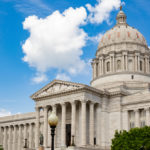 Missouri: Senate Bill 22 introduces a new process for ballot initiatives. Under the bill, a group can appeal the secretary of state’s summary. The court can make recommendations, but the secretary of state must revise the language within seven days. That received a House Elections Committee hearing this week would make it more difficult for judges to rewrite a secretary of state’s ballot summary. “To me this is a gross overstepping of the judiciary branch,” bill sponsor Sen. Rick Brattin, R-Harrisonville, said at the hearing. If the court finds that summary unfair, the secretary gets five days to write another draft. This process can happen one last time, and upon third revision the secretary gets just three days. Only then, if the court still finds the summary unfair, can a judge rewrite it. The back-and-forth process must take place on a set timeline prior to the general election. Brattin’s original bill eliminated the court’s ability to rewrite a ballot summary, he said at the committee hearing, but he worked with Senate Democrats to amend it.
Missouri: Senate Bill 22 introduces a new process for ballot initiatives. Under the bill, a group can appeal the secretary of state’s summary. The court can make recommendations, but the secretary of state must revise the language within seven days. That received a House Elections Committee hearing this week would make it more difficult for judges to rewrite a secretary of state’s ballot summary. “To me this is a gross overstepping of the judiciary branch,” bill sponsor Sen. Rick Brattin, R-Harrisonville, said at the hearing. If the court finds that summary unfair, the secretary gets five days to write another draft. This process can happen one last time, and upon third revision the secretary gets just three days. Only then, if the court still finds the summary unfair, can a judge rewrite it. The back-and-forth process must take place on a set timeline prior to the general election. Brattin’s original bill eliminated the court’s ability to rewrite a ballot summary, he said at the committee hearing, but he worked with Senate Democrats to amend it.
The House advanced legislation that would reinstate state-run presidential preference primaries and extend the no-excuse absentee voting period from two to six weeks. Supporters of House Bill 126 cited a widespread positive response to the recently enacted no-excuse voting period as a motivating factor. They also noted negative feedback on the 2024 party-run caucuses, which replaced the state-run primaries after they were eliminated as part of a law passed in 2022. The no-excuse absentee voting period has been in effect since August 2022 and allows voters to cast their ballot in elections in person or by mail starting two weeks before Election Day. Supporters of the bill said they hoped that extending the no-excuse voting period would further alleviate stress on election workers and encourage voters to cast their ballot. The state of Missouri ran March presidential primaries from 2000 until 2020. A 2022 law signed by former Gov. Mike Parson eliminated them. In 2024, the Republican Party held in-person caucuses in Missouri to select their delegates, while Democrats opted for a hybrid caucus with in-person voting and a mail-in ballot. Low participation in these caucuses, alongside vocal blowback from residents who preferred the state-run primaries, were cited as motivators for reinstating the primaries.
 Ohio: The $11 billion transportation budget is awaiting Gov. Mike DeWine’s signature, after passing both the House and Senate unanimously. But Democrats complained about a voter registration provision in the bill. And that apparently has raised questions for DeWine as well. According to WVXU, the Senate added to the transportation budget a provision the House had dropped; proof of citizenship for people who register to vote at the Bureau of Motor Vehicles. House Republicans had put in that provision initially, but then compromised with Democrats by changing it to a ban on BMV employees and deputy registrars from offering registration forms to people who are ineligible. Without threatening a veto, he repeated something he’s said before—that he would need to be persuaded to sign another election-related law. “I think the burden of proof is on anyone who wants to issue wants to change it,” DeWine said. “We’ve changed it a few times. We’ve done some different things. I’ll take a look at that one that gets to me.”
Ohio: The $11 billion transportation budget is awaiting Gov. Mike DeWine’s signature, after passing both the House and Senate unanimously. But Democrats complained about a voter registration provision in the bill. And that apparently has raised questions for DeWine as well. According to WVXU, the Senate added to the transportation budget a provision the House had dropped; proof of citizenship for people who register to vote at the Bureau of Motor Vehicles. House Republicans had put in that provision initially, but then compromised with Democrats by changing it to a ban on BMV employees and deputy registrars from offering registration forms to people who are ineligible. Without threatening a veto, he repeated something he’s said before—that he would need to be persuaded to sign another election-related law. “I think the burden of proof is on anyone who wants to issue wants to change it,” DeWine said. “We’ve changed it a few times. We’ve done some different things. I’ll take a look at that one that gets to me.”
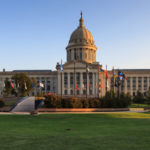 Oklahoma: Rep. Jim Olsen, R-Roland, has passed legislation further enhancing the integrity of Oklahoma’s electoral process. If House Bill 1005 becomes law, all voter identification cards must include a photo of the voter beginning in 2027. Under the bill, Service Oklahoma would be tasked with working with the Secretary of the State Election Board to develop and provide a free photo identification card that meets HB1005’s requirements. “Oklahoma’s elections are among the safest in the nation, and House Bill 1005 presents another opportunity to safeguard the integrity of our elections,” Olsen said. “By requiring a photo ID for all voters, we are securing the votes of all Oklahomans and enhancing transparency and accountability in our elections. I appreciate the support of my colleagues in the House as we work together to protect Oklahoma’s elections.” These identification requirements would apply to both in-person absentee voting and Election Day voting. HB1005 passed the House floor 75-18 on March 27 and now moves to the Senate, where it is carried by Sen. David Bullard, R-Durant.
Oklahoma: Rep. Jim Olsen, R-Roland, has passed legislation further enhancing the integrity of Oklahoma’s electoral process. If House Bill 1005 becomes law, all voter identification cards must include a photo of the voter beginning in 2027. Under the bill, Service Oklahoma would be tasked with working with the Secretary of the State Election Board to develop and provide a free photo identification card that meets HB1005’s requirements. “Oklahoma’s elections are among the safest in the nation, and House Bill 1005 presents another opportunity to safeguard the integrity of our elections,” Olsen said. “By requiring a photo ID for all voters, we are securing the votes of all Oklahomans and enhancing transparency and accountability in our elections. I appreciate the support of my colleagues in the House as we work together to protect Oklahoma’s elections.” These identification requirements would apply to both in-person absentee voting and Election Day voting. HB1005 passed the House floor 75-18 on March 27 and now moves to the Senate, where it is carried by Sen. David Bullard, R-Durant.
Lawmakers are considering a bill that could change the way elections work statewide. Rep. Mike Osburn (R-Edmond) calls House Bill 2106 a “common sense” voting bill. He introduced the bill with a simple goal — make election season easier for both voters and election boards. House Bill 2106 would designate five recurring election days each year. Those days would be scheduled in February, April, June, August, and November. Osburn said holding more elections in less days on a set annual schedule would keep the voters engaged while at the same time making election season more efficient. Major election dates like last November’s presidential election would not be affected, and the governor would have the power to call special elections under specific circumstances. Absentee and early voting processes would also stay the same. Earlier this week, the bill passed in the Oklahoma House 92-0. It will now go before the senate.
 Tennessee: Lawmakers are considering a bill that would make images of ballots cast by Tennessee voters available online. If passed, Section 8 of House Bill 0458/Senate Bill 0367 would require scanning machines that tabulate votes to create a “digital image of each ballot scanned”. The bill then requires the secretary of state’s office to make those digital images available on its website no later than the second Friday after an election. It is unclear if the ballot images that would be on the secretary of state’s website would be available for public viewing. The bill would change the deadline for purging the state’s voter rolls to 90 days before an election. During a subcommittee meeting on March 25, State Representative Tim Rudd, one of the main sponsors of the legislation, said the change would make Tennessee’s purge deadline compliant with federal law and said any future changes to maintain compliance would not require any amendments or votes. The bill would also ban all forms of online voting and ban all voting machines from being connected to the internet. If passed, the law would take effect on July 1, 2025.
Tennessee: Lawmakers are considering a bill that would make images of ballots cast by Tennessee voters available online. If passed, Section 8 of House Bill 0458/Senate Bill 0367 would require scanning machines that tabulate votes to create a “digital image of each ballot scanned”. The bill then requires the secretary of state’s office to make those digital images available on its website no later than the second Friday after an election. It is unclear if the ballot images that would be on the secretary of state’s website would be available for public viewing. The bill would change the deadline for purging the state’s voter rolls to 90 days before an election. During a subcommittee meeting on March 25, State Representative Tim Rudd, one of the main sponsors of the legislation, said the change would make Tennessee’s purge deadline compliant with federal law and said any future changes to maintain compliance would not require any amendments or votes. The bill would also ban all forms of online voting and ban all voting machines from being connected to the internet. If passed, the law would take effect on July 1, 2025.
 Texas: In a quick vote after little debate, the Senate approved a bill that would require voters to provide proof of citizenship before registering, and would restrict them to voting in congressional races only if they do not. The bill still needs approval in the House before it can become law. It would cost state officials nearly $2 million over the next five years to implement, according to the bill’s fiscal note, which doesn’t include any costs expected to be borne by local election officials. Senate Bill 16, written by state Sen. Bryan Hughes, and supported by all Senate Republicans, is modeled after an Arizona law that requires proof of citizenship to vote in state and local elections, but there are some important differences. For one thing, it would apply to already registered voters in Texas, rather than just new applicants. It would bar voters who don’t provide citizenship proof from voting in presidential elections, as well as state and local ones — a provision that federal courts have so far blocked in Arizona. And it prescribes new duties for local election officials to continually check the citizenship status of voters on their rolls — with potential felony charges for lapses. If approved by the Legislature, the new law would go into effect in September. Some election officials are concerned that the bill’s requirements will confuse voters. “It’s not enough time to get everyone familiar with the requirements. We have a primary in March” of 2026, said Jennifer Doinoff, president of the Texas Association of County Election Officials. “It could create a huge influx in provisional ballots.”
Texas: In a quick vote after little debate, the Senate approved a bill that would require voters to provide proof of citizenship before registering, and would restrict them to voting in congressional races only if they do not. The bill still needs approval in the House before it can become law. It would cost state officials nearly $2 million over the next five years to implement, according to the bill’s fiscal note, which doesn’t include any costs expected to be borne by local election officials. Senate Bill 16, written by state Sen. Bryan Hughes, and supported by all Senate Republicans, is modeled after an Arizona law that requires proof of citizenship to vote in state and local elections, but there are some important differences. For one thing, it would apply to already registered voters in Texas, rather than just new applicants. It would bar voters who don’t provide citizenship proof from voting in presidential elections, as well as state and local ones — a provision that federal courts have so far blocked in Arizona. And it prescribes new duties for local election officials to continually check the citizenship status of voters on their rolls — with potential felony charges for lapses. If approved by the Legislature, the new law would go into effect in September. Some election officials are concerned that the bill’s requirements will confuse voters. “It’s not enough time to get everyone familiar with the requirements. We have a primary in March” of 2026, said Jennifer Doinoff, president of the Texas Association of County Election Officials. “It could create a huge influx in provisional ballots.”
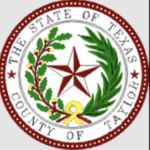 Taylor County, Texas: The Taylor County Commissioner’s court voted last week to accept a resolution opposing the elimination of county-wide polling. Taylor County Elections Administrator Freda Regan presented the resolution in response to a number of State House and Senate bills that have been introduced this legislative session, which aim to do away with county-wide polling, cease the use of electronic polling books, and revert back to paper ballots rather than ballot marking devices. Regan said this resolution is just one of many 66 other Texas counties have formally submitted. “There are counties that are not currently in the [County-wide polling] program that have also submitted the same resolution. Because they want the ability to apply to be a part of it,” Regan said. Regan says that Taylor County would have to increase the number of polling places, as well as pay more volunteers to run those locations, to be able to have one polling location in all 34 Taylor County voting Precincts. While this would increase the number of total locations, it would restrict voters to only the area within their precinct. Regan said she believes returning to that system would be much less convenient, resulting in voter confusion, lower voter participation, and potentially void provisional ballots if a vote is cast outside a voter’s assigned precinct.
Taylor County, Texas: The Taylor County Commissioner’s court voted last week to accept a resolution opposing the elimination of county-wide polling. Taylor County Elections Administrator Freda Regan presented the resolution in response to a number of State House and Senate bills that have been introduced this legislative session, which aim to do away with county-wide polling, cease the use of electronic polling books, and revert back to paper ballots rather than ballot marking devices. Regan said this resolution is just one of many 66 other Texas counties have formally submitted. “There are counties that are not currently in the [County-wide polling] program that have also submitted the same resolution. Because they want the ability to apply to be a part of it,” Regan said. Regan says that Taylor County would have to increase the number of polling places, as well as pay more volunteers to run those locations, to be able to have one polling location in all 34 Taylor County voting Precincts. While this would increase the number of total locations, it would restrict voters to only the area within their precinct. Regan said she believes returning to that system would be much less convenient, resulting in voter confusion, lower voter participation, and potentially void provisional ballots if a vote is cast outside a voter’s assigned precinct.
 West Virginia: At the urging of the secretary of state, West Virginia could tighten laws on acceptable forms of photo identification that can be used at polling places. The House of Delegates passed a Republican-sponsored measure, House Bill 3016, that would require a photo ID — typically a driver’s license, passport or a resident identification card — to vote in-person. It would eliminate several current options accepted at polling places that can validate identity, including a Medicaid card and utility bill. “What this bill seeks to prevent is voter fraud of any kind to the extent that it’s able,” said Del. J.B. Akers, R-Kanawha, who said the Secretary of State’s office said people have voted illegally with a photo ID. “We did hear that,” he said. The measure, sponsored by Del. Erica Moore, R-Roane, passed the House with a vote of 84-8. It now goes to the Senate for consideration.
West Virginia: At the urging of the secretary of state, West Virginia could tighten laws on acceptable forms of photo identification that can be used at polling places. The House of Delegates passed a Republican-sponsored measure, House Bill 3016, that would require a photo ID — typically a driver’s license, passport or a resident identification card — to vote in-person. It would eliminate several current options accepted at polling places that can validate identity, including a Medicaid card and utility bill. “What this bill seeks to prevent is voter fraud of any kind to the extent that it’s able,” said Del. J.B. Akers, R-Kanawha, who said the Secretary of State’s office said people have voted illegally with a photo ID. “We did hear that,” he said. The measure, sponsored by Del. Erica Moore, R-Roane, passed the House with a vote of 84-8. It now goes to the Senate for consideration.
Legal Updates
 California: Shasta County voters, Laura Hobbs and Dan Ladd, appeared in court this week regarding their lawsuit filed in January, which alleges numerous election law violations by the county clerk and his office. Representing themselves, Hobbs and Ladd described the case as an “urgent matter.” Hobbs requested Judge Benjamin Hanna to set a hearing date, but her request was denied. Judge Hanna explained that because they had just filed amended paperwork, defense attorney Christopher Pisano needs time to prepare a response. After the proceedings, Hobbs expressed understanding of the delay, saying, “It is okay. I think that it will be heard on its merits and the citizens will have a chance to present what they witnessed during this last election cycle, the laws that were violated. I do believe that we will have our day in court.” Hobbs and Ladd are scheduled to return to Hanna’s courtroom on May 12, hoping to have a trial date set then.
California: Shasta County voters, Laura Hobbs and Dan Ladd, appeared in court this week regarding their lawsuit filed in January, which alleges numerous election law violations by the county clerk and his office. Representing themselves, Hobbs and Ladd described the case as an “urgent matter.” Hobbs requested Judge Benjamin Hanna to set a hearing date, but her request was denied. Judge Hanna explained that because they had just filed amended paperwork, defense attorney Christopher Pisano needs time to prepare a response. After the proceedings, Hobbs expressed understanding of the delay, saying, “It is okay. I think that it will be heard on its merits and the citizens will have a chance to present what they witnessed during this last election cycle, the laws that were violated. I do believe that we will have our day in court.” Hobbs and Ladd are scheduled to return to Hanna’s courtroom on May 12, hoping to have a trial date set then.
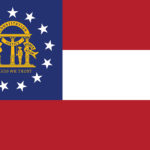 Georgia: U.S. District Court Judge Amy Totenberg has dismissed a long-running lawsuit challenging the security of Georgia’s electronic voting machines even though the judge maintained substantial concerns about the system. According to Totenberg’s ruling, the plaintiffs in Curling v. Raffensperger were not able to demonstrate that the state’s electronic voting system disenfranchises them from exercising their right to vote in elections. She wrote that the election activists Coalition for Good Governance and Georgia voters lacked standing in the lawsuit. Totenberg also wrote that some of the plaintiffs’ legal objections to the touchscreen ballot marking devices are more about policy disagreements rather than constitutional violations. Totenberg, however, wrote that she has substantial concerns about the electronic voting technology that has long faced allegations about the risks of being hacked and potentially compromising elections in Georgia. The state’s electronic Dominion Voting Systems machines were rolled out statewide in 2019, but by that time the state was already involved in the pre-emptive federal court legal battle with the Coalition for Good Governance and other individual plaintiffs who claim that the electronic system is vulnerable to cyber attacks and operational problems that violate voters’ constitutional rights. Totenberg credited the plaintiffs’ role in providing evidence that exposed a major breach of election equipment in Coffee County following the 2020 election. “Today’s ruling is just one more resounding vindication of Georgia’s elections,” Secretary of State Brad Raffensperger said. “From day one, we knew these accusations were meritless. All the real-world evidence shows that Georgia’s paper ballot system works well. Our local election officials are professionals. And the voters of this state know that their votes are counted securely, accurately, and quickly.”
Georgia: U.S. District Court Judge Amy Totenberg has dismissed a long-running lawsuit challenging the security of Georgia’s electronic voting machines even though the judge maintained substantial concerns about the system. According to Totenberg’s ruling, the plaintiffs in Curling v. Raffensperger were not able to demonstrate that the state’s electronic voting system disenfranchises them from exercising their right to vote in elections. She wrote that the election activists Coalition for Good Governance and Georgia voters lacked standing in the lawsuit. Totenberg also wrote that some of the plaintiffs’ legal objections to the touchscreen ballot marking devices are more about policy disagreements rather than constitutional violations. Totenberg, however, wrote that she has substantial concerns about the electronic voting technology that has long faced allegations about the risks of being hacked and potentially compromising elections in Georgia. The state’s electronic Dominion Voting Systems machines were rolled out statewide in 2019, but by that time the state was already involved in the pre-emptive federal court legal battle with the Coalition for Good Governance and other individual plaintiffs who claim that the electronic system is vulnerable to cyber attacks and operational problems that violate voters’ constitutional rights. Totenberg credited the plaintiffs’ role in providing evidence that exposed a major breach of election equipment in Coffee County following the 2020 election. “Today’s ruling is just one more resounding vindication of Georgia’s elections,” Secretary of State Brad Raffensperger said. “From day one, we knew these accusations were meritless. All the real-world evidence shows that Georgia’s paper ballot system works well. Our local election officials are professionals. And the voters of this state know that their votes are counted securely, accurately, and quickly.”
 New Mexico: Solomon Peña, who lost a race for the New Mexico Legislature and went on to orchestrate a series of shootings on the homes of his political opponents will be sentenced this summer. Peña is scheduled to receive his prison sentence at 9 a.m. on July 2 in Albuquerque, according to an order entered by U.S. District Judge Kea Riggs on March 21. Peña ran as a Republican for a seat in the state House of Representatives in 2022 and lost in a landslide by more than 47 points. A jury last month found Peña guilty of organizing a series of shootings that targeted the homes of four elected Democratic officials in December 2022 and January 2023 after he refused to accept defeat. No one was physically harmed in the attacks, but police found bullet holes in the buildings. The jurors found Peña guilty of one count of conspiracy for his role in the shootings; four counts of interfering with the 2022 elections; three counts of using or carrying a firearm during and in relation to a violent crime; one count of using or carrying a machine gun during and in relation to a violent crime; and one count of being a convicted felon in possession of a firearm and ammunition.
New Mexico: Solomon Peña, who lost a race for the New Mexico Legislature and went on to orchestrate a series of shootings on the homes of his political opponents will be sentenced this summer. Peña is scheduled to receive his prison sentence at 9 a.m. on July 2 in Albuquerque, according to an order entered by U.S. District Judge Kea Riggs on March 21. Peña ran as a Republican for a seat in the state House of Representatives in 2022 and lost in a landslide by more than 47 points. A jury last month found Peña guilty of organizing a series of shootings that targeted the homes of four elected Democratic officials in December 2022 and January 2023 after he refused to accept defeat. No one was physically harmed in the attacks, but police found bullet holes in the buildings. The jurors found Peña guilty of one count of conspiracy for his role in the shootings; four counts of interfering with the 2022 elections; three counts of using or carrying a firearm during and in relation to a violent crime; one count of using or carrying a machine gun during and in relation to a violent crime; and one count of being a convicted felon in possession of a firearm and ammunition.
 North Carolina: A woman who posted a selfie with her ballot on X — and was ordered to take it down — may continue her lawsuit challenging the state’s law against photographing ballots, a federal judge decided Friday. U.S. District Judge Louise Flanagan denied motions to dismiss Susan Hogarth’s lawsuit against members of the state board of elections, her local elections board and her local district attorney, finding that she has standing in her First Amendment case. North Carolina is one of 14 states that bans photographing a “voted official ballot” or voters without the permission of election officials. The restrictions are intended to prevent vote buying, voter intimidation, delays and distractions at polling places and to maintain the privacy of other voters. Hogarth took a selfie with her filled-out ballot when she voted in primaries last March, which she posted on X, formerly known as Twitter. The state board of elections then mailed her a letter directing her to take the post down and informing her that she had violated state law. When she returned to the polls in November armed with a court order allowing her to take ballot pictures, she was instructed by polling place staff to stop taking photos and delete them — before staff called the state elections board to confirm that she had an exemption.
North Carolina: A woman who posted a selfie with her ballot on X — and was ordered to take it down — may continue her lawsuit challenging the state’s law against photographing ballots, a federal judge decided Friday. U.S. District Judge Louise Flanagan denied motions to dismiss Susan Hogarth’s lawsuit against members of the state board of elections, her local elections board and her local district attorney, finding that she has standing in her First Amendment case. North Carolina is one of 14 states that bans photographing a “voted official ballot” or voters without the permission of election officials. The restrictions are intended to prevent vote buying, voter intimidation, delays and distractions at polling places and to maintain the privacy of other voters. Hogarth took a selfie with her filled-out ballot when she voted in primaries last March, which she posted on X, formerly known as Twitter. The state board of elections then mailed her a letter directing her to take the post down and informing her that she had violated state law. When she returned to the polls in November armed with a court order allowing her to take ballot pictures, she was instructed by polling place staff to stop taking photos and delete them — before staff called the state elections board to confirm that she had an exemption.
 South Dakota: A ballot question committee is suing South Dakota’s top election official over a new law that shortens the window for petition circulation by three months. Dakotans for Health filed the lawsuit in federal court against Secretary of State Monae Johnson. “This new law is just another effort to silence the voices of South Dakotans and deny them the right to make decisions that impact their lives,” said Dakotans for Health Chairman Rick Weiland in a news release. South Dakota’s Republican-dominated Legislature approved the legislation earlier this month, and Republican Gov. Larry Rhoden signed it into law last week. The law moves the filing deadline up from May to February for petitions seeking to place citizen-initiated questions on the ballot during general election years. The law affects initiated measures, which need petition signatures from 17,508 registered South Dakota voters to make the ballot, and initiated constitutional amendments, which need 35,017 signatures. State law says no signatures may be collected more than 24 months preceding the general election.
South Dakota: A ballot question committee is suing South Dakota’s top election official over a new law that shortens the window for petition circulation by three months. Dakotans for Health filed the lawsuit in federal court against Secretary of State Monae Johnson. “This new law is just another effort to silence the voices of South Dakotans and deny them the right to make decisions that impact their lives,” said Dakotans for Health Chairman Rick Weiland in a news release. South Dakota’s Republican-dominated Legislature approved the legislation earlier this month, and Republican Gov. Larry Rhoden signed it into law last week. The law moves the filing deadline up from May to February for petitions seeking to place citizen-initiated questions on the ballot during general election years. The law affects initiated measures, which need petition signatures from 17,508 registered South Dakota voters to make the ballot, and initiated constitutional amendments, which need 35,017 signatures. State law says no signatures may be collected more than 24 months preceding the general election.
 Texas: Two months before a scheduled trial, a coalition of voting rights groups is withdrawing from a long-running challenge to the political maps Texas drew after the 2020 U.S. census, which the groups said diluted the voting power of Black, Latino, Asian American and Pacific Islander Texans. The outcome of the case, which has been making its way through the courts for nearly four years, will have implications for how much power Texans will have to decide who represents them in the state Legislature and U.S. Congress. The voting-rights coalition said it decided against continuing the litigation after its claims were dismissed by a trial-court panel of federal judges in February, following a ruling by the 5th U.S. Circuit Court of Appeals that experts said upended longstanding precedents. The coalition that withdrew included Fair Maps Texas Action Committee, OCA-Greater Houston, the North Texas chapter of the Asian Pacific Islander Americans Public Affairs Association, Emgage Texas, and 13 individual voters. They are represented by the Southern Coalition for Social Justice, the ACLU of Texas, the Asian American Legal Defense and Education Fund, and the Brennan Center for Justice. Their case had been consolidated with that of other plaintiffs who were also challenging the maps. The remaining claims are still set to go to trial beginning May 21.
Texas: Two months before a scheduled trial, a coalition of voting rights groups is withdrawing from a long-running challenge to the political maps Texas drew after the 2020 U.S. census, which the groups said diluted the voting power of Black, Latino, Asian American and Pacific Islander Texans. The outcome of the case, which has been making its way through the courts for nearly four years, will have implications for how much power Texans will have to decide who represents them in the state Legislature and U.S. Congress. The voting-rights coalition said it decided against continuing the litigation after its claims were dismissed by a trial-court panel of federal judges in February, following a ruling by the 5th U.S. Circuit Court of Appeals that experts said upended longstanding precedents. The coalition that withdrew included Fair Maps Texas Action Committee, OCA-Greater Houston, the North Texas chapter of the Asian Pacific Islander Americans Public Affairs Association, Emgage Texas, and 13 individual voters. They are represented by the Southern Coalition for Social Justice, the ACLU of Texas, the Asian American Legal Defense and Education Fund, and the Brennan Center for Justice. Their case had been consolidated with that of other plaintiffs who were also challenging the maps. The remaining claims are still set to go to trial beginning May 21.
Opinions This Week
National Opinions: Executive order, II, III, IV, V, VI, VII, VIII | Proof-of-citizenship | Native American voting rights | Voting rights, II, III | Disenfranchisement | Election security | Threats | Primary system | Stephen Richer
Arizona: Executive order
Indiana: Secretary of state
Kansas: Voting rights
Minnesota: Executive order | SAVE Act
Nebraska: Democracy
Nevada: Executive order | Election security
New York: Voting rights
Pennsylvania: Vote by mail | Drop boxes, II
Texas: Election legislation | Executive order
Wyoming: Proof-of-citizenship
Upcoming Events
AI + Elections: A Different Mindset, A New Skillset, and A Growing Toolset: As artificial intelligence tools rapidly evolve, election administrators are exploring how these technologies can support their work—without compromising security, accuracy, or trust. Join The Elections Group and the AI + Elections Clinic at Arizona State University’s Mechanics of Democracy Laboratory on April 8 at noon EDT via Zoom for this timely conversation about what it means to be AI-aware in election administration and how to thoughtfully experiment with emerging technologies in your office. This webinar will focus on the practical side of using AI in elections: how to approach AI with the right mindset, build foundational skills, and evaluate the growing number of tools available. We’ll discuss real-world examples of how AI can assist with routine tasks like drafting communications, organizing information, and identifying trends, while also addressing key risks, limitations and ethical considerations. Panelists include Bill Gates, the executive director of the Mechanics of Democracy Laboratory at Arizona State University’s Watts College of Public Service and Community Solutions and a former Maricopa County, Arizona, Supervisor; Tonya Wichman, the director of the Defiance County, Ohio, Board of Elections; Diana Bowman, the associate dean for applied research and partnerships and a professor of law at Arizona State University’s Sandra Day O’Connor College of Law; and Noah Praetz, the president of The Elections Group. When, April 8 at 12pm. Where: Online
Portland, Oregon’s 2024 RCV Implementation: Portland, Oregon completely reimagined its electoral system in 2024. A major part of that reform was the adoption of ranked choice voting; single-winner RCV for Mayor and Auditor and proportional RCV for City Council. What did it take to get RCV implemented in Portland? Join the Ranked Choice Voting Research Center for this webinar to hear from officials with the City of Portland and Multnomah County about their RCV implementation experience, from adoption to election day. When: April 10, 2pm Eastern. Where: Online.
Partisan Primaries, Polarization, and the Risks of Extremism: The Safeguarding Democracy Project at UCLA promotes research, collaboration, and advocacy under the leadership of UCLA Law Professor Richard L. Hasen; one of the nation’s leading election scholars. The Safeguarding Democracy Project is built upon the premise that tackling issues of the U.S. election integrity must be collaborative: across ideologies, across scholarly disciplines, and as a bridge between theory and practice. This session will feature speakers: Julia Azari, Marquette University, Ned Foley, The University of Ohio, Moritz College of Law, Seth Masket, Denver University, and Rick Pildes, NYU Law School and moderator Richard L. Hasen, (Director, Safeguarding Democracy Project, UCLA). When: April 10, 3:15pm Eastern. Where: Online
Can We Save Democracy?: In a recent article, Steven Levitsky, Professor of Government at Harvard University and co-author of How Democracies Die, predicts that “U.S. democracy will likely break down during the second Trump administration, in the sense that it will cease to meet standard criteria for liberal democracy: full adult suffrage, free and fair elections, and broad protection of civil liberties.” In this online event, two leaders of national pro-democracy organizations will explain what they are doing to prove him wrong. Maya Wiley, President and CEO of the Leadership Conference on Civil and Human Rights, and Virginia Kase Solomón, President and CEO of Common Cause, will join Levitsky in a discussion about what the strategies of pro-democracy movements are in this moment, whether they will be enough, and what else can be done. Archon Fung, Director of the Ash Center for Democratic Governance and Innovation, will moderate. When: April 16 4pm to 5pm Eastern. Where: Online
2025 EAC Local Leadership Council Annual Meeting: The U.S. Election Assistance Commission (EAC)’s Local Leadership Council (LLC) will host an in-person public meeting on April 21 – 22, 2025, at the Grand Bohemian Charlotte hotel in Charlotte, North Carolina. During the meeting, members will conduct regular business and discuss EAC updates and upcoming programs. The LLC consists of 100 members. The EAC appoints two members from each state after soliciting nominations from each state’s election official professional association. If you are a member of the public and you are interested in attending, please register below. The EAC will only accept written comments and questions from members of the public. If you would like to participate, please email clearinghouse@eac.gov with your full name and question or comment no later than 5:00 p.m. ET on April 18, 2025. When: April 21-22. Where: Online
Election Center April Special Workshop: The Election Center April Special Workshop will be held in Pittsburgh. The conference will run April 23-25 and CERA courses will be offered April 26 and 27. The CERA courses offered will be: Course 9 (History III, 1965 to present); Course 10 (Constitutional Law of Elections); and Renewal Course 38 (Leadership in Election Administration). When: April 23-27. Where: Pittsburgh, Pennsylvania.
2025 EAC Standards Board Annual Meeting: The U.S. Election Assistance Commission (EAC)’s Standards Board will host an in-person public meeting on April 24-25, 2025 at the Grand Bohemian Charlotte hotel in Charlotte, North Carolina. During the meeting, members will conduct regular business and discuss EAC updates and upcoming programs. The Standards Board consists of 55 state election officials selected by their respective chief state election official and 55 local election officials selected through a process supervised by the chief state election official. If you are a member of the public and you are interested in attending, please register below. The EAC will only accept written comments and questions from members of the public. If you would like to participate, please email clearinghouse@eac.gov with your full name and question or comment no later than 5:00 p.m. ET on April 23, 2025. When: April 24-25. Where: Charlotte, North Carolina
How Did Misinformation and AI Deepfakes Impact the 2024 Election?: With rapid advances in the ability of artificial intelligence to produce text, images, and video, many were concerned about its potential impact on the 2024 election. Now that the dust has settled, join R Street for an engaging conversation about whether deepfakes and misinformation impacted the 2024 election and how we can apply lessons learned to future elections. When: April 29 1pm to 2pm Eastern. Where: Online.
iGO Summer Conference: The International Association of Government Officials will hold their summer conference in Kansas City, Missouri from June 20-24. Please refer to the iGO website for more information and to register for the event.
NASED Summer Conference: The National Association of State Election Directors will hold its summer conference in Oklahoma from July 22-24. Please refer to the NASED website for more information when it becomes available.
NASS Summer Conference: The National Association of Secretaries of State will hold its summer conference in Biloxi, Mississippi from August 4-7. Please refer to the NASS website for more information when it becomes available.
Election Center Annual Conference: The Election Center Annual Conference will be held in Salt Lake City. The conference will run August 20-22 and CERA courses will be offered August 23 and 24. The CERA courses offered will be: Course 5 (Ethics); Course 6 (Communications & Public Relations); and Two renewal courses to be announced. When: August 20 to 24. Where: Salt Lake City.
Job Postings This Week
electionlineWeekly publishes election administration job postings each week as a free service to our readers. To have your job listed in the newsletter, please send a copy of the job description, including a web link to mmoretti@electionline.org. Job postings must be received by 5pm on Wednesday in order to appear in the Thursday newsletter. Listings will run for three weeks or till the deadline listed in the posting.
Candidate Services Coordinator, Seminole County, Florida – The Candidate Services Coordinator is a key member of the Supervisor of Elections Office, responsible for ensuring smooth administrative operations with a focus on candidate services and assists with accounting functions and payroll processing. This position requires attention to detail, organizational skills, and the ability to effectively handle multiple responsibilities while maintaining confidentiality and compliance with applicable laws and regulations. This position is responsible for managing the candidate qualifying process, serving as primary point of contact for candidates, maintaining accurate records related to candidate filings, financial disclosures, and other required documentation, and coordinating candidate workshops and providing training on election procedures and campaign finance rules. Salary: $36,000 – $46,000 Annually. Application: For the complete job listing and to apply, click here.
County Clerk, Lane County, Oregon– Lane County is seeking an experienced and dynamic leader to serve as County Clerk and Election & Recording Principal Manager, overseeing critical functions that uphold the integrity of our democratic processes and public records. This pivotal role leads a dedicated team committed to excellence, accuracy, and service to our community. As County Clerk, you will: Plan, organize, and conduct all federal, state, and local elections; Oversee voter registration, property tax appeals, and permanent real property records; Manage marriage licensing, domestic partnership registrations, and archived records; Ensure compliance with Federal, State, and Local laws governing elections and records; Lead a team of 14 full-time employees, ensuring exceptional service and operational efficiency; and Prepare and analyze data, manage budgets, and oversee technology solutions that support Clerk operations. This is a fast-paced, high-impact role where you’ll serve as Lane County’s Clerk and Election & Recording Principal Manager, working under the direction of the Director of Operations to deliver services that affect all residents. Why Lane County? Lane County, the fourth most populous county in Oregon, offers a rich and diverse landscape stretching from the Pacific Ocean to the Cascade Mountains. Our county seat, Eugene, is a vibrant community with ample opportunities for living, working, and recreation. We are proud to offer an excellent benefits package and the chance to make a meaningful impact in public service. Salary: $90,625.60 – $133,286.40 Annually. Application: For the complete job listing and to apply, click here.
Customer Support Consultant, Hart InterCivic– A Customer Support Center Consultant Level 1 (CSC 1) responds to requests for assistance from Hart InterCivic customers for all Hart InterCivic products. The CSC I’s primary responsibilities are to: Answer, resolve and route customer queries; Maintain professionalism and “customer first” approach in stressful situations; Acquire, demonstrate, and maintain depth of knowledge with all Hart products and product documentation to best support Hart customers; Acquire and maintain functional support-level knowledge of unique customer requirements and their implementation in Hart products; Provide data tracking, reporting, and analytics for CSC projects; Manage and maintain the security of Hart’s assets and customer information; and Serve as a backup/overflow resource Technical Services Workstation deployment and RMA management. Application: For the complete job listing and to apply, click here.
Deputy Director, Minnesota Secretary of State–The Office of the Minnesota Secretary of State (OSS) is seeking a Deputy Elections Director that supports the Elections Director in providing division-wide strategic and administrative management, along with program and staff management, of all activities within the Elections Division to ensure the Division’s goals, statutory responsibilities, and initiatives are achieved. The OSS oversees statewide elections and operates the statewide voter registration system. The work of OSS’s Election Division ensures the Minnesota election system is fair, open, impartial, and secure. This position will supervise and provide work direction to nine Elections Division staff in the fulfillment of it’s mission to conduct free, fair, and secure elections; Ensure compliance with labor contracts and state law so that employees effectively perform assigned job duties to achieve established objectives; Develop and coordinate the goals and priorities of the Elections Division to ensure state and federal legal requirements are met, staff meet reporting deadlines, and that services are delivered in an effective manner. This position will work closely with the Elections Development team in support of OSS-managed elections tools including the Statewide Voter Registration System (SVRS) and Election Reporting System (ERS). This position will also coordinate and support the work of the Elections Security Navigator team. Salary:$37.60 – $54.16 / hourly; $78,508 – $113,086 / annually. Deadline: April 7. Application: For the complete job listing and to apply, click here (when you click on the job listing link, use Job No. 85091 to search).
Election Specialist, Candidate Services, Palm Beach County, Florida– This position is responsible for the management and execution of services provided to candidates, political committees, electioneering communication organizations, political parties, community development districts, and special taxing districts. This includes establishing and maintaining an organized system for managing the required forms and records associated with filing and qualifying for office, candidate petitions, campaign finance reporting, financial disclosures, initiative petitions, and other related activities. Candidate Services staff must be organized and personable with a great attitude, be able to work well in a team environment, and meet deadlines under pressure. Excellent work ethic, including consistent performance, integrity, reliability, and attendance, is a must. Must be detail-oriented, be able to handle simultaneous projects, and be a self-starter. Salary: $21.63 – $24.04. Application: For the complete job listing and to apply, click here.
Elections Specialist, Pinal County, Arizona– Perform a variety of paraprofessional and technical functions in the administration and support of the elections functions for Pinal County under general supervision. Work in this classification requires an individual to be able to perform the essential job functions satisfactorily. Reasonable accommodations may be made to enable individuals with disabilities to perform the primary classification functions herein described. Since every duty associated with this classification may not be described herein, employees may be required to perform duties not specifically spelled out in this classification description, but which may be reasonably considered to be incidental in the performing of their duties just as though they were actually written out in this description. Salary: $42,000 – $59,117 Annually. Application: For the complete job listing and to apply, click here.
Elections Systems Administrator, Arapahoe County, Colorado – The Election Systems Administrator performs leadership level administrative, and professional work in carrying out a comprehensive public facing service operation. This position specifically leads and supports all areas of ballot processing, ballot auditing and election technology maintenance. Salary: $64,293.06 – $96,439.98 Annually. Deadline: April 16. Application: For the complete job listing and to apply, click here.
IT Assistant Manager, Palm Beach County, Florida– The Assistant IT Manager plays a supportive role in the smooth operation of the IT department, ensuring that both the technical infrastructure and the team are aligned with the organization’s goals. This position involves collaborating closely with the Election Technology Director to oversee the implementation of technology solutions that meet the needs of the organization. The Assistant IT Manager helps maintain an efficient and effective IT environment. Oversee daily operations of the IT department, including help desk operations and performance, troubleshooting issues, and ensuring efficient workflow. Hold department meetings and provide weekly performance summary. Manage IT projects under the direction of the Election Technology Director, ensuring timely completion, budget requirements, and organizational needs. Enforce IT policies and procedures to ensure data security, network access, and system availability. Assist in the management of IT staff by developing skills, coaching, and communicating job expectations. Coordinate vendor renewals, assist with IT budget development, and manage grant applications. Evaluate and assist in maintaining the organization’s disaster recovery and business continuity plans for IT. Assist with IT Public Records requests research and fulfillment. Assist the Election Technology Director in all facets of IT operations. Lead projects and mentor team members. Application: For the complete job listing and to apply, click here.
Language Access & Outreach Coordinator, King County, Washington–This is an amazing opportunity to be engaged in the election process! The Department of Elections is searching for energetic and resourceful professionals who like to “get stuff done”. The Language Access and Outreach Coordinator position in the Elections Department combines an exciting, fast paced environment with the opportunity to cultivate talents and apply a variety of skills. The ideal candidate will thrive in a collaborative, innovative, and fast-paced environment and will not hesitate to roll up both sleeves, work hard, have fun, and get the job done. The Language Services and Community Engagement Team at King County Elections provides language access work for the whole Elections Department, translating election materials into six languages (Chinese, Korean, Russian, Somali, Spanish, and Vietnamese). In addition, the Team works collaboratively across Department and with community to identify and remove barriers to voting. These communities include those who are disabled, experiencing houselessness, immigrants, youth, and those with limited mobility. This team is recruiting a Language Access and Outreach Coordinator who will support the program for the Chinese language. This position provides bilingual assistance, translation, and community outreach support. This individual must be able to read, write, understand, and speak Chinese at the language proficiency testing level used by the Department. In addition, as part of the community engagement program, this individual will participate in voter registration and voter education activities with community partners and provide support to our Voter Education Fund partners. This position will provide language access assistance to our communications team and administrative support to other election work groups as needed. Salary: $38.37 – $48.64 Hourly. Application: For the complete job listing and to apply, click here.
Project Manager, HartIntercivic– Project Managers at Hart InterCivic are highly motivated “self-starters” who are enthusiastic about providing exceptional customer service. Working with other members of the Professional Services and Operations teams, the Project Manager directs activity, solves problems, and develops lasting and strong relationships with our customers. Hart InterCivic’s unique and industry-known culture of innovation, transparency, and customer-centric focus creates an environment where team members will continually grow and be challenged to develop their careers. Application: For the complete job listing and to apply, click here.
Physical Security Specialist, Palm Beach County, Florida– This position is responsible for administration of the physical security programs in a manner consistent with Supervisor of Elections Office policies, procedures, quality standards, and applicable local, state, and federal regulations. These programs include conducting facility security risk assessments, assisting with access control, monitoring alarms and CCTV systems, and providing security related training. Must be organized and personable with a great attitude, be able to work well in a team environment, and meet deadlines under pressure. Excellent work ethic, including consistent performance, integrity, reliability, and attendance, is a must. Candidate must be detail-oriented and understand the importance of security and safety for all. Must be available 24/7 365, be able to handle simultaneous projects, and be a self-starter. Application: For the complete job listing and to apply, click here.
Regional Sales Representative II, Soch– Soch is a pioneer in solving the public sector’s most critical business challenges by digitizing and automating complex processes. We offer a suite of products that address election management, FOIA management, candidate filing, campaign finance and other critical business challenges in the government sector. We are looking for an election sales professional with a minimum of 5 years of experience in the election domain. Someone who is passionate about democracy and has a desire to help local election administrators run successful elections. Your primary focus will be on developing customer relations, and completing sales of Soch’s products. This includes but is not limited to election management solution for poll workers, inventory, election security, incident report, chain of custody, public records and other important aspects of election management to conduct fair, safe and secure elections. You will be responsible for managing opportunities and relationships with customers in a specified assigned territory/state(s). Leveraging your established connections and local election knowledge will contribute significantly to your growth in this position. Email, cold calling, outreach via LinkedIn and other networking channels to expand customer base. Strong communication skills needed to promote/demonstrate products and services offered by Soch. Travel to conferences and local/state election offices as needed for the facilitation of sales. You must be a quick learner to learn the products and services offered by Soch. You will be responsible for meeting sales targets and generating revenue, contributing to the overall goals and plans developed by the management team. Maintain a deep understanding of customer needs and monitor their preferences to ensure relevant sales strategies. Salary: $114,000 – $121,800 per year plus commission. Application: For the complete job listing and to apply, click here.
Regional Sales Representative III, Soch– Soch is a pioneer in solving the public sector’s most critical business challenges by digitizing and automating complex processes. We offer a suite of products that address election management, FOIA management, system provisioning and other critical business challenges in the government sector. We are looking for an election sales professional with a minimum of 1-2 years of experience in the election domain. Someone who is passionate about democracy and has a desire to help local election administrators run successful elections. Your primary focus will be on developing customer relations, and completing sales of Soch’s products. This includes but is not limited to election management solution for poll workers, inventory, election security, incident report, chain of custody, public records and other important aspects of election management to conduct fair, safe and secure elections. You will be responsible for managing opportunities and relationships with customers in a specified assigned territory/state(s). Leveraging your established connections and local election knowledge will contribute significantly to your growth in this position. Email, cold calling, outreach via LinkedIn and other networking channels to expand customer base. Strong communication skills needed to promote/demonstrate products and services offered by Soch. Travel to conferences and local/state election offices as needed for the facilitation of sales. You must be a quick learner to learn the products and services offered by Soch. You will be responsible for meeting sales targets and generating revenue, contributing to the overall goals and plans developed by the management team. Maintain a deep understanding of customer needs and monitor their preferences to ensure relevant sales strategies. Salary: $67,000 – $72,500 per year plus commission. Application: For the complete job listing and to apply, click here.
Registrar of Voters, Sonoma County, California –Appointed by the Board of Supervisors, and reporting to the County Administrator/Executive, the Registrar of Voters provides leadership, administrative policy, and operational direction for the Registrar of Voters Department, including analyzing and interpreting legislation affecting the department and performing a variety of complex work in the planning and conducting of all Federal, State, and local elections. The Registrar of Voters is a critical leadership position, responsible for ensuring the electoral process in the County of Sonoma is conducted professionally and with the highest level of professional election standards, consistently demonstrating neutrality and non-partisan decision-making. This is a position of trust and confidence. Work is performed with a maximum amount of independent judgment and initiative. The Registrar of Voters has the primary responsibility for conducting Primary, General, and Special Elections within Sonoma County, and directing the operations of a department. This responsibility includes the successful execution of all components of the County’s election management process, including: registration of voters, poll worker coordination and training, vote center establishment aligned with any accessibility requirements, ballot creation, voting system security, ballot processing and tallying, the certification of election returns to the Secretary of State, and the provision of candidate services such as candidate filing and finance. Furthermore, this position has the sole responsibility for ensuring that election processes are in full compliance with County, State, and Federal legal requirements, communicating election results to the public, and providing information and responding to the media on election related matters. As the Department Head, it is anticipated the Registrar of Voters will directly supervise approximately 3-4 reports, including a Chief Deputy Registrar of Voters and administrative manager. The Department’s three Elections Managers are responsible for managing one or more of the Department’s program areas which include Voter Registration, Ballot Scanning and Adjudication, Poll Workers and Vote Center Supplies, Outreach Programs, Candidate and Campaign Services, Petitions, and Vote by Mail. Each area is responsible for overseeing important aspects of the election process to ensure smooth elections throughout the year. Salary: $195,036 – $237,072. Deadline: April 14. Application: For the complete job listing and to apply, click here.
Sales & Marketing Specialist, Soch– Soch is a pioneer in solving the public sector’s most critical business challenges by digitizing and automating complex processes. We offer a suite of products that address election management, FOIA management, system provisioning and other critical business challenges in the government sector. We are looking for a sales and marketing professional with a minimum of 3 years of experience. Someone who is passionate about democracy and has a desire to help local election administrators run successful elections. Sales: Your primary focus will be on developing customer relations, and completing sales of Soch’s products. This includes but is not limited to election management solution for poll workers, inventory, election security, incident report, chain of custody, public records and other important aspects of election management to conduct fair, safe and secure elections.vYou will be responsible for managing opportunities and relationships with customers in a specified assigned territory/state(s).vEmail, cold calling, outreach via LinkedIn and other networking channels to expand customer base.vStrong communication skills needed to promote/demonstrate products and services offered by Soch.vTravel to conferences and local/state election offices as needed for the facilitation of sales. Marketing: You will be primarily responsible for graphic design, social media, email campaigns, conferences and creating content as needed for the outreach. Create and post content on social media via content scheduler Expert in implementing marketing strategies and techniques to increase sales activity and revenue. Salary: $45,200 – $51,400 Application: For the complete job listing and to apply, click here.
Sales Director, SOE Software– The ideal candidate will be a combination of an experienced salesperson and someone familiar with US elections. This position will focus on the sales of voting modernization software within the US, targeting state and local governments. This position will report to the President of the company. This is a predominantly autonomous and challenging role that requires the right candidate to show leadership, ownership, enthusiasm, professionalism, and an entrepreneurial spirit toward business. This is a role that requires frequent travel within the region. The role would suit someone currently in a commercial role, selling software solutions/services into the US marketplace in the public sector. The ideal candidate will have strong state and local government contacts. The successful candidate will have considerable experience in building, growing, and managing a database of truly qualified prospects. Application: For the complete job listing and to apply, click here.
Senior Elections Supervisor, Placer County, California– The Placer County Clerk-Recorder-Elections Office has a current vacancy for a Senior Elections Supervisor. The Office is looking for someone with experience in the development, supervision, and administration of elections programs. The ideal candidate will have supervised in an elections office or similar agency that emphasizes cooperation, accountability and transparency and has the ability to communicate effectively with management, staff, other county departments, jurisdictions and the voters of Placer County. To learn more about the Elections Division of the Clerk-Recorder-Elections Office please click here. In addition to the minimum education and experience, the ideal candidate will possess experience and vision in the following areas: State and federal election laws; Voting systems; General operating policies and functions of the California Secretary of State’s Office; Best practices and current trends in successful election administration, community education and outreach programs; Principles and techniques of effective employee supervision and development, training, management practices and public administration. Salary: $69,056.00 – $86,195.20/year. Application: For the complete job listing and to apply, click here.
Senior Programs Officer, Elections, Election Trust Initiative– The senior program officer is part of a small project team that works to advance evidence-based and nonpartisan solutions that improve the accessibility, integrity, and trustworthiness of the U.S. election administration system. This position will work with the team and our partners to develop and oversee strategies to strengthen the field of election administration, identify and vet grantees, provide business planning and capacity building support to key organizations in the field, develop metrics to assess and monitor the portfolio’s progress in attaining its objectives, and coordinate strategies with allied philanthropic partners also investing in the elections sector. This work will involve building relationships with elections officials, researchers, policymakers, non-profit organizations, donors, and other key stakeholders. The position is based in Washington, D.C. and will participate in core office days on Tuesdays and Wednesdays and will have flexibility to work from home for the remainder of each week. The position has a fixed time frame that may be extended based on the success of the program, funding sources and board and decisions on continued support. The position will report to the executive director of the Election Trust Initiative. Salary: $156K-$174K. Application: For the complete job listing and to apply, click here.
Voter Services Clerk, Seminole County, Florida – The Voter Services Clerk serves as the primary customer service representative for the Seminole County Supervisor of Elections Office. This position is responsible for the accurate maintenance and entry of voter registration information, ensuring the integrity and confidentiality of voter data, and providing essential assistance to voters, including answering inquiries and processing voter-related documents. The Clerk will also be involved in various clerical and administrative tasks associated with voter services, ensuring compliance with applicable state and federal election laws. Responsibilities include processing new voter registrations, updates or changes to existing registrations, vote-by-mail ballot requests, and returns, as well as petition verifications and other voter record-related tasks, providing accurate voter registration and election information to the public in person, by phone, or via mail, in accordance with Florida state laws, regulations, and procedures, conducting research to resolve issues related to voter registration records, utilizing sources both within the voter database and external government websites or online resources, ensuring the accuracy and completeness of voter registration records by verifying information, validating signatures on candidate and initiative petitions, maintaining and update street maintenance files to ensure an up-to-date and accurate residential address database for Seminole County. Salary: $17 – $22 Hourly. Application: For the complete job listing and to apply, click here.
Voting Systems Technician, Bernalillo County, New Mexico– Under general supervision, is responsible for certifying, calibrating, and maintaining the County voting machines (ICE) and (ICC) scanners; maintains the Bureau of Elections (BOE) warehouse, including exterior of building, all equipment and supplies; and assists BOE staff during all election cycles. Salary: $34,715.20 – $39,936.00 Annually. Application: For the complete job listing and to apply, click here.